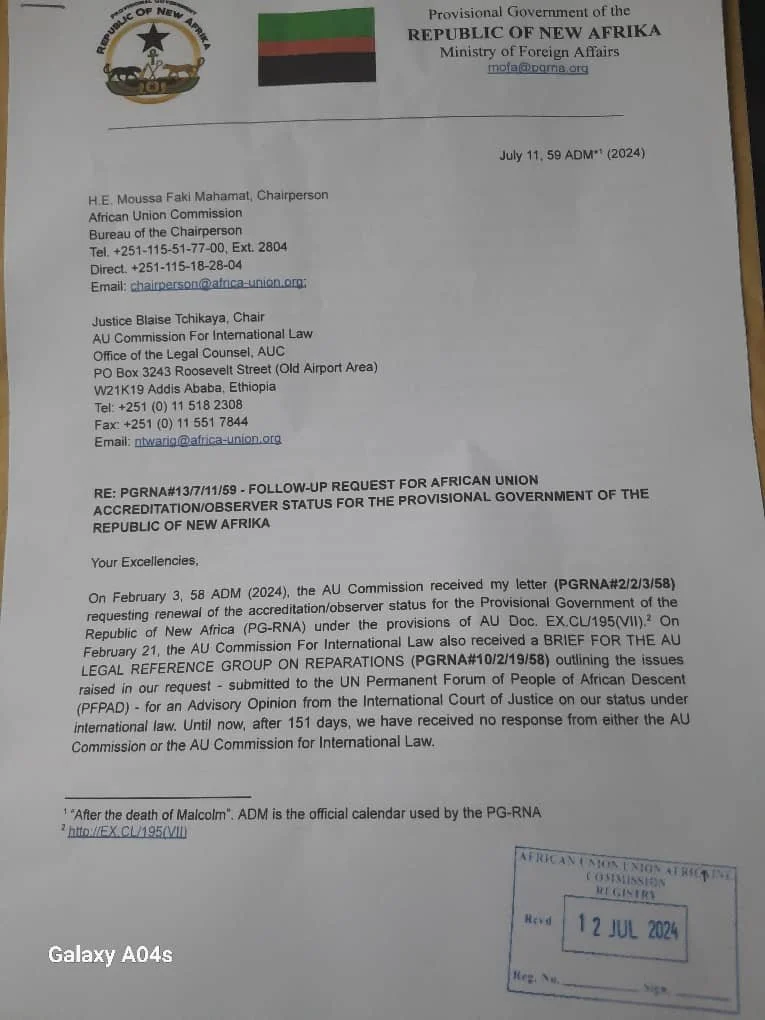OVERVIEW OF CURRENT PGRNA FOREIGN POLICY AGENDA
In January, 58 ADM (2024), the People’s Revolutionary Leadership Council approved the Ministry of Foreign Affairs Immediate Program of Action submitted by Interim Minister of Foreign Affairs Siphiwe Baleka, with the following Primary Objectives:
Win support in the African Union and the United Nations for the New Afrikan and Afro Descendant plebiscite for self determination in the United States;
Secure “right to return” citizenship legislation in African Union member states;
Request an Advisory Opinion from the International Court of Justice on our status as prisoners of war under the Geneva Convention and other fundamental questions pertaining to our reparations claims;
Secure diplomatic recognition from AU member states and other liberation movements
The basis of PGRNA foreign policy is the words of Imari Obadele delivered in a speech on Revolution and Nation Building, April 1969:
"The fifth strategic element is international support, which we absolutely must have in order to win our freedom and recognition. recognition of yourself as a nation flows first, of course, from yourself, your own recognition, your own understanding that you are a nation. But then it flows from others. When other nations begin to recognize you, you may then enter into the international arena and demand things that we can not now demand as a people - even as a people who have at this point declared ourselves a separate nation."
Imari Obadele in 1970:
“Indeed, along with the petition drive a specific campaign must be conducted among New York legislators and U.S. Congressmen (particularly black ones) to make them - and, concurrently, the world - see that our cause is just under moral law and correct under international law and that the law of the United States is deficient in failing to provide a peaceful formula for the separation of communities seeking their independence. . . . Let us return a moment to the first question: how sovereignty is to be achieved in the first place. From what has already been indicated, it is clear that the overall strategy is to present the United States, the United Nations, and the world with an implacable accomplished fact: the free vote of a community for independence. It is, then, to seek a favorable deployment of world-wide diplomatic pressures and internal (U.S.) political pressures. It is, finally, to follow up the independence vote with creation of a local government and a pattern of action by the local government and the Republic that constitutes the exercise of Sovereignty. In other words, the Government, after the vote, must act like a government. . . . Next we shall demonstrate to the world, by means of a plebiscite, a vote, that it is New Afrika, not the United States, which has the consent of the people who dominate those areas”
The words of Imari Obadele in 1972:
“The problem with international law is that there is nobody there to enforce it - except the powerful. Powerful nations enforce international law only when it suits them - or when they are forced to. . . . The development of foreign support, inside and outside the United Nations, is another of the vital supporting strategies. . . ”;
The words of Imari Obadele also in 1972:
“The essential strategy of our struggle for land is to array enough power (as in jiu-jitsu, with a concentration of karate strength at key moments) to force the greatest power, the United States, to abide by international law, to recognize and accept our claims to independence and land. The purpose of this strategy can be further simplified: it is to create a situation for the United States where it becomes cheaper to relinquish control of the Five States than to continue a war against us to take back or hold the area”; and
The 1933 Convention on the Rights and Duties of States as quoted by Imari Obadele in 1987:
“Article one of the convention states: ‘The state as a person of international law should possess the following qualifications: (a) a permanent population; (b) a defined territory; (c) government; and (d) the capacity to enter into relations with the other states.’”





